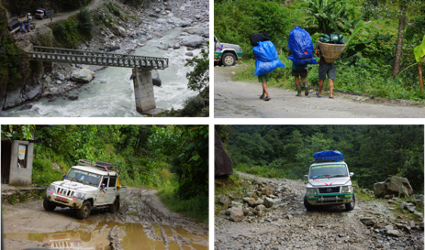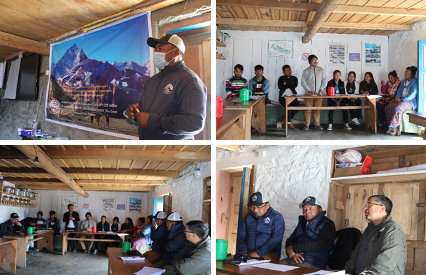progress
Executive Summary
8 January 2024
This pilot program enlisted four proficient Nepali facilitators, Achyut Aryal, Ang Kazi Sherpa, Bhala Kaji Kulung and Bheem Rai to collaborate with individuals in different villages along the mountainous pathway. The objective is to safeguard the region's ecological, faunal, and cultural assets while simultaneously generating revenue for the community through commercial enterprises along the GHT, which spans all Nepal from Taplejung in the east to Darchula in the west.
Therefore, this pilot was be implemented sequentially utilizing the Appreciative and Participatory Planning and Action (APPA) approach. APPA encourages and stimulates villages to recognize and execute promising initiatives. It is being utilised in the early stages of the GHT to identify potential local technical and financial resources, as well as methods to be utilized.
The APPA approach to planning and development focuses on identifying and harnessing a community's resources, expertise, and favorable attributes. The process consists of four primary stages: Dream, Design, Deliver, and Discovery. During the rigorous APPA exercises, communities generate practical activities for GHT that effectively tackle challenges and capitalize on significant opportunities.
Due to Nepal's federal structure, the effective implementation of the GHT program relies heavily on local governments' involvement, including both urban and rural municipalities. The municipalities can utilize their invaluable resources in this manner, particulary for supporting infrastructure development along the trail.
To initiate the pilot program, the four skilled Nepali APPA and Village Banking experts visited the villages of Chheskam and Bung, which fall under the jurisdiction of the Mahakulum Rural Municipality in the Solu district—South and East of Mt. Everest National Park. The purpose of these visits was to gain a comprehensive understanding of the local context and the necessary procedures and policies to be adhered to when undertaking the GHT project. The team conducted two APPA exercises in each village and organized stakeholder consultation meetings in both villages. The meetings included numerous villagers and important stakeholders such as municipal officials, teachers, representatives from local clubs, and representatives from cooperatives.

After these events, the team reached the following main conclusions:
The Mahakulung Rural Municipality is enthusiastic about its involvement in GHT activities and they have even pledged to allocate funds to help implement the GHT project.
The villagers of Chheskam and Bung actively participate in the APPA process and are enthusiastic about the GHT concept. However, they may require additional support--to be specified--to independently implement GHT activities in their villages.
All participants in the APPA exercises prioritize the construction of trails as a crucial activity to enhance tourism in the village and are willing to undertake tasks within their jurisdiction.
There is significant potential to extend the APPA program to other nearby villages within the Mahakulung Rural Municipality.
Every participant expressed anticipation that their economic activity would increase with the expansion of the village's tourism industry.

Despite the interest shown by local clubs, financial institutions, and other stakeholders, their financial resources and capabilities are limited.
The villages have severely restricted access to financial institutions.
Transforming existing farmers' groups into village banking groups can potentially promote a village banking approach for community empowerment. This would effectively expand GHT activities with active community engagement.
Approximately USD 6000 is required to facilitate the expansion of GHT activities in a single village (municipality ward)--[To be furthers specified: What these funds would be used for. Are they above and beyond the current microproject budget estimates:].
The following recommendations are essential for expanding APPA and all GHT activities: Those required before taking APPA workshops onward to other villages and those that can follow over time after the villages have been engaged.
Establishing collaborations with national organizations to broaden the scope of GHT initiatives, ensuring high standards and openness in all GHT activities throughout all villages; specifying which organizations would be most valuable, helpful.
Employing local facilitators to extend GHT activities in the villages was suggested by the villagers during the APPA exercises, to ensure community support for all GHT activities in the villages.
Prioritize the expansion of APPA to the remaining villages within Mahakulung Municipality before expanding to other Municipalities.
Ensure ongoing collaboration with the municipality to secure financial and technical assistance for expansion.
Organize local APPA TOT (Training of Trainers) sessions for village facilitators and potential candidates to localize the APPA program.
Enhance the capacities of neighborhood clubs and financial institutions to participate.
Initiate efforts to convert existing farmers' groups into WEP/WORTH (Women Empowerment Programme) groups by strengthening their organizational capabilities and vision.
Establish introductory entrepreneurship courses for aspiring lodge and hotel owners in the area.
Expand the scope of services provided by financial institutions in the villages through close collaboration.




